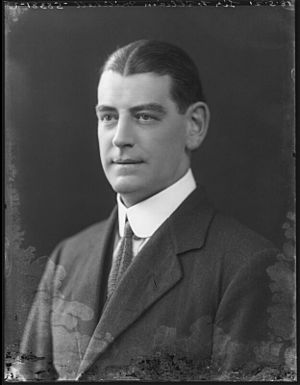William Mitchell-Thomson, 1st Baron Selsdon facts for kids
Quick facts for kids
The Lord Selsdon
|
|
|---|---|
 |
|
| Postmaster General | |
| In office 4 November 1924 – 4 June 1929 |
|
| Monarch | George V |
| Prime Minister | Stanley Baldwin |
| Preceded by | Vernon Hartshorn |
| Succeeded by | Hastings Lees-Smith |
| Parliamentary Secretary to the Board of Trade | |
| In office 1 April 1921 – 19 October 1922 |
|
| Monarch | George V |
| Prime Minister | David Lloyd George |
| Preceded by | Philip Cunliffe-Lister |
| Succeeded by | The Viscount Wolmer |
| Parliamentary Secretary to the Ministry of Food Control | |
| In office 19 April 1920 – 1 April 1921 |
|
| Monarch | George V |
| Prime Minister | David Lloyd George |
| Preceded by | Charles McCurdy |
| Succeeded by | Post abolished |
| Member of the House of Lords Lord Temporal |
|
| In office 14 January 1932 – 24 December 1938 Hereditary Peerage |
|
| Preceded by | Peerage created |
| Succeeded by | The 2nd Lord Selsdon |
| Member of Parliament for Croydon South |
|
| In office 6 December 1923 – 14 January 1932 |
|
| Preceded by | Allan Macgregor Smith |
| Succeeded by | Herbert Williams |
| Member of Parliament for Glasgow Maryhill |
|
| In office 14 December 1918 – 26 October 1922 |
|
| Preceded by | Constituency created |
| Succeeded by | John William Muir |
| Member of Parliament for North Down |
|
| In office 28 April 1910 – 25 November 1918 |
|
| Preceded by | Thomas Lorimer Corbett |
| Succeeded by | Thomas Watters Brown |
| Member of Parliament for North West Lanarkshire |
|
| In office 8 February 1906 – 10 February 1910 |
|
| Preceded by | Charles Mackinnon Douglas |
| Succeeded by | William Pringle |
| Personal details | |
| Born | 15 April 1877 Edinburgh, Scotland |
| Died | 24 December 1938 (aged 61) London, England |
| Nationality | British |
| Political party | Scottish Unionist Irish Unionist Conservative |
| Spouse | Annie McEacharn |
| Children | Peter |
William Lowson Mitchell-Thomson, 1st Baron Selsdon (born April 15, 1877 – died December 24, 1938) was an important Scottish politician. He was known as Sir William Mitchell-Thomson before 1932. He served as the British Postmaster-General from 1924 to 1929. This job meant he was in charge of the country's mail and early telephone services.
Contents
Early Life and Education
William Mitchell-Thomson was born in Edinburgh, Scotland. His father, Mitchell Mitchell-Thomson, was a well-known person in Edinburgh. He was even given the special title of "baronet" in 1900.
William went to good schools like Winchester College and Balliol College, Oxford. He also studied law at the University of Edinburgh. After finishing his studies in 1902, he became a lawyer in Scotland. He spent some time traveling before starting his political career.
A Career in Politics
William Mitchell-Thomson was a Member of Parliament (MP) for many years. An MP is a person elected by people to represent them in the country's government, called Parliament.
Early Parliamentary Roles
- He first became an MP in 1906 for North West Lanarkshire.
- From 1910 to 1918, he was an MP for North Down.
- During World War I, he helped manage the country's supplies. He was recognized for his work and given an award.
Important Government Jobs
After the war, William Mitchell-Thomson took on more important roles:
- He represented Britain on a special council that helped manage the economy after the war.
- He also worked as a secretary for the Ministry of Food and the Board of Trade. These roles involved helping with food supplies and trade rules.
Representing Different Areas
He continued to be an MP for different areas:
- From 1918 to 1922, he was the MP for Glasgow Maryhill.
- Then, from 1923 to 1932, he represented Croydon South in South London.
Postmaster-General and Beyond
From 1924 to 1929, he held the important job of Postmaster General. This role meant he was in charge of the postal service and the growing telephone network in Britain. During a big workers' strike in 1926, he played a key role in keeping things running. In 1924, he also became a Privy Counsellor, which is a special advisor to the King.
In 1932, William Mitchell-Thomson left the House of Commons. He was then given a new special title: Baron Selsdon. This meant he became a "Lord" and joined the House of Lords, another part of the UK Parliament.
The Selsdon Report and Television
One of his most famous contributions was to the development of television.
- In 1934, the British government asked Lord Selsdon to lead a committee.
- This committee's job was to study if a public television service could be started.
- They also had to suggest how such a service should work.
- The committee's findings were published in a report called the "Selsdon Report" in 1935.
- This report suggested that the BBC should be in charge of developing television.
- Lord Selsdon himself appeared on the very first day of BBC television broadcasts on November 2, 1936. He was the chairman of the Television Advisory Committee at that time.
Family Life
William Mitchell-Thomson was married twice. In 1907, he married Madeleine McEacharn. They had a son named Peter. Later, he married Effie Lilian Loder Johnson.
Lord Selsdon passed away in London in December 1938, when he was 61 years old. His son, Peter, inherited his title and became a well-known racing driver.

